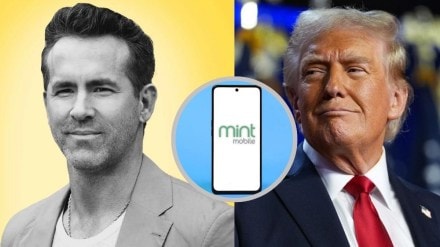For decades, celebrities have lent their names to everything from perfumes to tequila. But the next big frontier in celebrity entrepreneurship appears to be something more essential and more surprising: mobile phone service.
Once a territory dominated by telecom giants, the mobile network space is now becoming a playground for actors, influencers, and even presidents.
Ryan Reynolds, whose success with Mint Mobile seems to have set the standard, is at the vanguard of this movement. Reynolds became the brand’s face and contributed to increasing its visibility with his trademark humour and media acumen after reportedly purchasing a 25% stake in the low-cost wireless provider in 2019.
When T-Mobile acquired Mint Mobile for $1.35 billion in 2023, Reynolds reportedly received $300 million as compensation for his efforts. Not only did Reynolds win that deal, but it also signalled a change in culture.
Suddenly, telecom executives weren’t the only ones who could own a portion of a mobile network. It was intended for celebrities with sizable fan bases and the charm to turn admirers into paying clients.
Now, more celebrities and brands are getting in on the game. Will Arnett, Jason Bateman, and Sean Hayes launched SmartLess Mobile, piggybacking on their popular podcast to offer low-cost data plans for users who do not actually need unlimited data.
Klarna, the Swedish buy-now-pay-later platform, announced plans to launch its own wireless service as part of a broader neobank strategy.
And in June, the Trump Organization unveiled Trump Mobile, offering an “All-American” phone plan alongside a $499 gold-coloured phone and perks like telehealth and roadside assistance.
The Ryan Reynolds effect
MVNOs, or mobile virtual network operators, are not new. They function by leasing bandwidth from major carriers like Verizon, AT&T, and T-Mobile, then selling phone plans under their brands.
What is new, however, is the star power now propelling these services into the spotlight. Reynolds may have been the first to fuse Hollywood with telecom at scale, but now others see MVNOs as an opportunity to monetise celebrity followings more directly and more reliably.
MVNOs have historically addressed market niches by catering to populations that traditional carriers either overlooked or were unable to effectively target.
By allowing brands to white-label network access, big carriers could tap into these markets without stretching their own brand identities.
For the MVNOs, it is a capital-light business model that skips the need to build infrastructure, instead focusing on marketing, pricing, and service.
But consumer behaviour is also playing a crucial role in the MVNO boom. Americans are more loyal to their phones than to the carriers that power them. With the rise of eSIMs, switching carriers has become easier than ever.
This, combined with declining trust in big telecom companies, has made users more open to exploring new, offbeat options especially when they are backed by someone they admire.
Even though MVNOs use the same networks as the legacy players, analysts observe that many customers are drawn to the appearance of independence that these providers provide.
For example, SmartLess Mobile positions itself as “data-sane” and “BS-free,” appealing to customers who are fed up with paying for limitless data that they never use.
In order to bundle services and gain a deeper understanding of user behaviour, Klarna views its entry into the mobile market as a logical extension of its current financial ecosystem.
Additionally, Trump Mobile is relying on the fervent devotion of MAGA members to set itself apart in a crowded market.
Telecom is the next celebrity empire
Mobile networks are appealing to celebrities for reasons other than possible financial gain; these include audience control and ownership.
Celebrities are increasingly looking for ways to control the channels through which they interact with their fans in a time when social media platforms are the keys to communication. A special route to that ownership is provided by telecom.
Through platforms like Telecom-as-a-Service (TaaS), stars can launch private-label networks that give them control over subscriber data, direct access to fans, and the ability to bundle exclusive perks.
This model lets celebrities transform followers into monthly paying subscribers far more reliably than one-off social media endorsements.
Imagine Taylor Swift offering mobile subscribers early access to concert tickets or exclusive music content. Or the Kardashians integrating mobile plans with their beauty brands and Hulu series. The potential for deepened fan engagement is massive.
A report by OXIO, a TaaS provider, revealed that over 50% of US consumers would consider switching to a celebrity-branded mobile plan. With over 300 million smartphone users in the US alone, even a tiny sliver of that audience could translate into massive recurring revenue for the right celebrity.
But while the potential is vast, the execution must be thoughtful. Experts warn that celebrity MVNOs must go beyond surface-level branding.
To sustain long-term success, they must provide real value, whether that is pricing, service, content, or a mix of all three. Past efforts, like ESPN’s failed mobile venture in the early 2000s, show that star power alone is not enough.
Still, this emerging model could redefine celebrity-fan relationships. With private-label networks, celebrities can create immersive ecosystems where mobile service is just one part of a broader brand experience.
They can promote their products, distribute exclusive content, and even gain insights into fan behaviours through first-party data, all without relying on platforms like Meta or TikTok.
In this sense, the telecom revolution is not just about who can sell the cheapest phone plan. It is about who can turn cultural influence into digital infrastructure.
And if Ryan Reynolds, podcast hosts, and political families are any indication, we have only seen the beginning.
